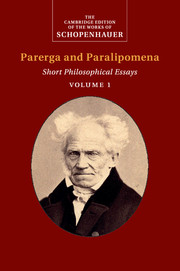Book contents
- Frontmatter
- Contents
- General Editor’s Preface
- Editorial Notes and References
- Introduction
- Notes on Text and Translation
- Chronology
- Bibliography
- Parerga and Paralipomena: Contents
- Preface
- Sketch of a History of the Doctrine of the Ideal and the Real
- Fragments for the History of Philosophy
- On University Philosophy
- Transcendent Speculation on the Apparent Deliberateness in the Fate of the Individual
- Essay on Spirit-Seeing and Related Issues
- Aphorisms on the Wisdom of Life
- Chapter I Fundamental Division
- Chapter II What One Is
- Chapter III What One Has
- Chapter IV What One Represents
- Chapter V Counsels and Maxims
- Chapter VI On the Different Stages of Life
- Versions of Schopenhauer’s Text
- Glossary of Names
- Index
Chapter V - Counsels and Maxims
Published online by Cambridge University Press: 30 June 2022
- Frontmatter
- Contents
- General Editor’s Preface
- Editorial Notes and References
- Introduction
- Notes on Text and Translation
- Chronology
- Bibliography
- Parerga and Paralipomena: Contents
- Preface
- Sketch of a History of the Doctrine of the Ideal and the Real
- Fragments for the History of Philosophy
- On University Philosophy
- Transcendent Speculation on the Apparent Deliberateness in the Fate of the Individual
- Essay on Spirit-Seeing and Related Issues
- Aphorisms on the Wisdom of Life
- Chapter I Fundamental Division
- Chapter II What One Is
- Chapter III What One Has
- Chapter IV What One Represents
- Chapter V Counsels and Maxims
- Chapter VI On the Different Stages of Life
- Versions of Schopenhauer’s Text
- Glossary of Names
- Index
Summary
Even less than in other places do I aim here forcompleteness, for I would otherwise have to repeatthe many maxims, some excellent, which have beenlaid down by thinkers of all ages, from Theognis andPseudo-Solomon to La Rochefoucauld, and it would beimpossible for me to avoid many already well-wornplatitudes. But together with completeness,systematic order also falls away for the most part.We can console ourselves about the loss of these twoby realizing that, when it comes to matters likethis, they would almost inevitably bring boredom intheir wake. I only provide what happened to occur tome, seemed to be worth relating, and, as far as Ican remember, has not been said before, at least notentirely and in this manner; hence I am providingmerely afterthoughts to that which others havealready achieved in this vast field.
But in order to introduce some order into the greatdiversity of the views and counsels that belonghere, I will divide them into general ones; thoseconcerning our attitude towards ourselves; towardsothers; and finally towards the course of the worldand fate.
General views
(1) I regard as the supreme rule of all wisdom of lifea sentence that Aristotle casually pronounced in theNicomachean Ethics(VII, 12): ὁ ϕρόνιμος τὸ ἄƛυπον διὠκϵι, οὐ τὸ ἡδὐ(quod dolore vacat, non quodsuave est, persequitur vir prudens). TheLatin version of the sentence is feeble; ittranslates better into German, for instance: ‘It isnot pleasure, but painlessness that the sensibleperson pursues’; or ‘The sensible person aims atpainlessness, not enjoyment.’ Its truth is based onthe fact that the nature of all enjoyment and allhappiness is negative, whereas that of pain ispositive. The exposition and justification of thislast sentence are found in my chief work, vol. 1,§58. But I wish to explain it here with the help ofa fact that can be observed daily. If the entirebody is healthy and in one piece except for somesmall sore, or otherwise painful spot, the health ofthe whole does not enter consciousness, butattention is focused continuously on the pain of theinjured spot and our entire enjoyment of life islost.
- Type
- Chapter
- Information
- Schopenhauer: Parerga and ParalipomenaShort Philosophical Essays, pp. 355 - 418Publisher: Cambridge University PressPrint publication year: 2014

